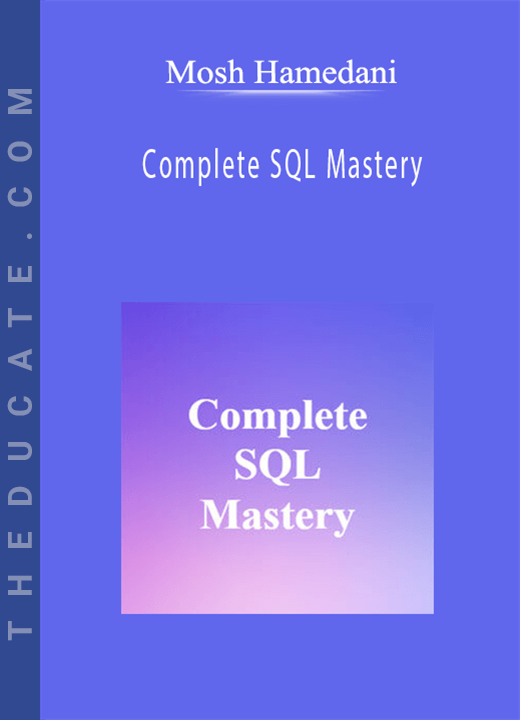Description
Mosh Hamedani – Complete SQL Mastery
Accelerate from Beginner to Advanced in Just 11 Hours
Big databases are everywhere these days. Facebook, Netflix, Uber, Airbnb use SQL-driven databases – to name just a few.
So, to be a successful developer or data scientist you need to know SQL inside-out.
SQL isn’t complicated – or at least it doesn’t need to be, so long as you learn it the right way.
Problem is – too many other courses out there jump around, skipping important concepts or simply teaching things badly.
That’s why this course goes further than most. You’ll get in-depth knowledge and skills that are built-up sequentially to make sure you don’t have any gaps.
It takes you from whatever level you’re at to advanced skills, without delay – using real-life examples and applicable concepts to get you ready for any SQL job or project
Clear and concise, packed with plenty of exercises, solutions and free of “fluff”.
Enroll
-
What You’l Learn…
I’ve put a lot of thought and time into making this course the most complete SQL course available on the market at the moment.
Every module contains information and activities that are relevant to real-life jobs or the kind of tasks you may get on interview.
- Write complex SQL queries
- Joins (inner, outer, natural, cross)
- Views
- Stored procedures
- Functions
- Events
- Triggers
- Transactions
- Concurrency
- Use indexing for performance
- Design relational databases
- Secure databases
- And much, much more!
Bite-sized, memorable and easy-to-digest videos with zero fluff
Who is this course for?
- Anyone who wants to learn to design and query relational databases
- Computer science students who want to better understand SQL
- Anyone pursuing a job in back-end development, database administration or data science
- SQL developers who want to brush up on their SQL skills
Course Curriculum
Getting Started (00:25)
Start1- Introduction (0:18)
Preview2- What is SQL (3:24)
Preview3- Installing MySQL on Mac (4:58)
Preview4- Installing MySQL on Windows (5:20)
Preview5- Creating the Databases (8:32)
Preview6- What You’ll Learn (2:31)
Retrieving Data From a Single Table (00:53)
Start1- The SELECT Statement (5:50)
Preview2- The SELECT Clause (8:48)
Preview3- The WHERE Clause (5:17)
Preview4- The AND, OR and NOT Operators (6:52)
Preview5- The IN Operator (3:03)
Start6- The BETWEEN Operator (2:12)
Start7- The LIKE Operator (5:37)
Start8- The REGEXP Operator (9:21)
Start9- The IS NULL Operator (2:26)
Start10- The ORDER BY Clause (7:06)
Start11- The LIMIT Clause (3:26)
Retrieving Data From Multiple Tables (01:02)
Start1- Inner Joins (8:26)
Start2- Joining Across Databases (2:47)
Start3- Self Joins (4:13)
Start4- Joining Multiple Tables (6:46)
Start5- Compound Join Conditions (3:41)
Start6- Implicit Join Syntax (2:20)
Start7- Outer Joins (6:27)
Start8- Outer Join Between Multiple Tables (6:18)
Start9- Self Outer Joins (2:12)
Start10- The USING Clause (5:22)
Start11- Natural Joins (1:21)
Start12- Cross Joins (3:14)
Start13- Unions (8:29)
StartA Quick Note
Inserting, Updating, and Deleting Data (00:42)
Start1- Column Attributes (3:24)
Start2- Inserting a Row (5:46)
Start3- Inserting Multiple Rows (3:18)
Start4- Inserting Hierarchical Rows (5:53)
Start5- Creating a Copy of a Table (8:47)
Start6- Updating a Single Row (3:55)
Start7- Updating Multiple Rows (3:14)
Start8- Using Subqueries in Updates (5:36)
Start9- Deleting Rows (1:24)
Start10- Restoring the Databases (1:06)
Summarizing Data (00:33)
Start1- Aggregate Functions (9:19)
Start2- The GROUP BY Clause (7:21)
Start3- The HAVING Clause (8:50)
Start4- The ROLLUP Operator (5:05)
StartA Quick Note
Writing Complex Query (00:45)
Start1- Introduction (1:28)
Start2- Subqueries (2:29)
Start3- The IN Operator (3:39)
Start4- Subqueries vs Joins (5:07)
Start5- The ALL Keyword (4:52)
Start6- The ANY Keyword (2:36)
Start7- Correlated Subqueries (5:36)
Start8- The EXISTS Operator (5:39)
Start9- Subqueries in the SELECT Clause (4:29)
Start10- Subqueries in the FROM Clause (2:58)
Essential MySQL Functions (00:33)
Start1- Numeric Functions (2:54)
Start2- String Functions (5:47)
Start3- Date Functions in MySQL (4:08)
Start4- Formatting Dates and Times (2:14)
Start5- Calculating Dates and Times (3:08)
Start6- The IFNULL and COALESCE Functions (3:29)
Start7- The IF Function (4:54)
Start8- The CASE Operator (5:23)
Views (00:18)
Start1- Creating Views (5:36)
Start2- Altering or Dropping Views (2:52)
Start3- Updatable Views (5:12)
Start4- THE WITH OPTION CHECK Clause (2:18)
Start5- Other Benefits of Views (2:37)
Stored Procedures (00:48)
Start1- What are Stored Procedures (2:18)
Start2- Creating a Stored Procedure (5:34)
Start3- Creating Procedures Using MySQLWorkbench (1:21)
Start4- Dropping Stored Procedures (2:09)
Start5- Parameters (5:26)
Start6- Parameters with Default Value (8:18)
Start7- Parameter Validation (6:40)
Start8- Output Parameters (3:55)
Start9- Variables (4:33)
Start10- Functions (6:28)
Start11- Other Conventions (1:51)
StartA Quick Note
Triggers and Events (00:22)
Start1- Triggers (7:31)
Start2- Viewing Triggers (1:20)
Start3- Dropping Triggers (0:52)
Start4- Using Triggers for Auditing (4:52)
Start5- Events (4:33)
Start6- Viewing, Dropping and Altering Events (2:04)
Transactions and Concurrency (00:49)
Start1- Transactions (2:44)
Start2- Creating Transactions (5:11)
Start3- Concurrency and Locking (4:07)
Start4- Concurrency Problems (7:25)
Start5- Transaction Isolation Levels (5:42)
Start6- READ UNCOMMITTED Isolation Level (3:26)
Start7- READ COMMITTED Isolation Level (3:01)
Start8- REPEATABLE READ Isolation Level (3:29)
Start9- SERIALIZABLE Isolation Level (2:18)
Start10- Deadlocks (6:11)
Data Types (00:35)
Start1- Introduction (0:43)
Start2- String Types (2:25)
Start3- Integer Types (2:52)
Start4- Fixed-point and Floating-point Types (1:42)
Start5- Boolean Types (0:46)
Start6- Enum and Set Types (3:36)
Start7- Date and Time Types (0:44)
Start8- Blob Types (1:17)
Start9- JSON Type (10:24)
Designing Databases (01:30)
Start1- Introduction (1:25)
Start2- Data Modelling (2:26)
Start3- Conceptual Models (4:34)
Start4- Logical Models (7:24)
Start5- Physical Models (6:27)
Start6- Primary Keys (3:23)
Start7- Foreign Keys (5:48)
Start8- Foreign Key Constraints (5:22)
Start9- Normalization (1:24)
Start10- 1NF- First Normal Form (2:42)
Start11- Link Tables (4:01)
Start12- 2NF- Second Normal Form (6:32)
Start13- 3NF- Third Normal Form (1:43)
Start14- My Pragmatic Advice (2:55)
Start15- Don’t Model the Universe (4:24)
Start16- Forward Engineering a Model (2:35)
Start17- Synchronizing a Model with a Database (4:48)
Start18- Reverse Engineering a Database (3:11)
Start19- Project- Flight Booking System (0:23)
Start20- Solution- Conceptual Model (7:59)
Start21- Solution- Logical Model (9:03)
Start22- Project – Video Rental Application (1:05)
Start23- Solution- Conceptual Model (6:59)
Start24- Solution- Logical Model (8:29)
Start25- Creating and Dropping Databases (1:41)
Start26- Creating Tables (3:13)
Start27- Altering Tables (2:56)
Start28- Creating Relationships (4:47)
Start29- Altering Primary and Foreign Key Constraints (2:10)
Start30- Character Sets and Collations (6:29)
Start31- Storage Engines (2:27)
StartA Quick Note
Indexing for High Performance (00:58)
Start1- Introduction (0:41)
Start2- Indexes (2:49)
Start3- Creating Indexes (5:00)
Start4- Viewing Indexes (3:19)
Start5- Prefix Indexes (3:40)
Start6- Full-text Indexes (7:50)
Start7- Composite Indexes (5:12)
Start8- Order of Columns in Composite Indexes (9:16)
Start9- When Indexes are Ignored (5:03)
Start10- Using Indexes for Sorting (7:02)
Start11- Covering Indexese (1:58)
Start12- Index Maintenance (1:25)
Start13- Performance Best Practices
Securing Databases (00:20)
Start1- Introduction (0:33)
Start2- Creating a User (3:12)
Start3- Viewing Users (1:29)
Start4- Dropping Users (0:48)
Start5- Changing Passwords (1:06)
Start6- Granting Privileges (4:53)
Start7- Viewing Privileges (1:34)
Start8- Revoking Privileges (1:20)
Start9- Wrap Up (0:44)







9 reviews for Mosh Hamedani – Complete SQL Mastery
There are no reviews yet.